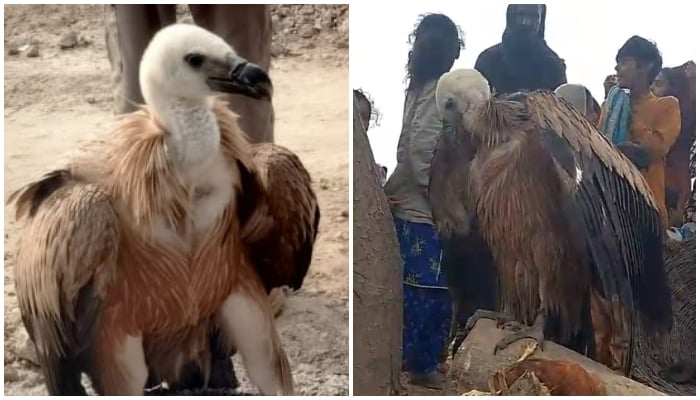RAHIM YAR KHAN: Wildlife officials rescued a vulture in Rukanpur village near Khanpur, Punjab, after it was captured by locals who found it grounded, and had been trying to tend to the bird as it was unable to fly or feed, before alerting the authorities for proper rehabilitation.
Videos showed a large crowd of excited villagers gathered around the scavenger bird, likely a Eurasian griffon vulture, filming it after it reportedly fell to the ground, separated from its flock.
In one of the videos, a villager mentioned that they had taken good care of the vulture after capturing it a day earlier and even attempted to feed it meat.
He added that the vulture was neither able to fly nor would it eat anything.
The villager mentioned that he had fulfilled his responsibility by saving the vulture’s life and notifying officials from the wildlife department to nurse it back to health.
Another video showed officials from the provincial wildlife department rescuing the vulture from the village. A wildlife officer told the media that they would care for the bird until it regained its strength and could return to its natural habitat.
World Wildlife Fund (WWF) has declared oriental white-backed and long-billed vultures critically endangered, compelling the international community to take steps to ensure that the species goes extinct in Pakistan, which is home to eight species of vultures.
Earlier this month, a special squad from Punjab’s wildlife department recovered nearly 1,000 illegally captured lizards and arrested several suspected poachers during a raid in the Raiwind area.
The suspects were allegedly attempting to sell the lizards, which are used to produce a costly oil extracted from their fat.
Acting on tips about the trafficking operation, wildlife officials intercepted the suspects who were reportedly bringing the lizards to a gathering near Raiwind.
The lizards, commonly known as ‘sanda’ lizards, had been captured in the nearby Changa Manga area, where traps were set to immobilise them for easier handling.
Authorities revealed that the traffickers had deliberately broken the lizards’ spines, rendering them unable to move. This gruesome tactic is employed to prevent the lizards from escaping and to facilitate their transport.
A senior wildlife official indicated that some local employees may be involved in this illicit trade, raising concerns about corruption within the department.
The fat from these lizards is often marketed as a remedy for various ailments, including sexual dysfunction and muscular weakness, fetching high prices in local and foreign markets.
Under the Punjab Wildlife Act, the hunting and trafficking of these lizards is illegal. Following the raid, authorities have registered a case against the suspects, who now face prosecution. Officials confirmed that all the seized lizards had suffered significant injuries, preventing them from moving freely.








